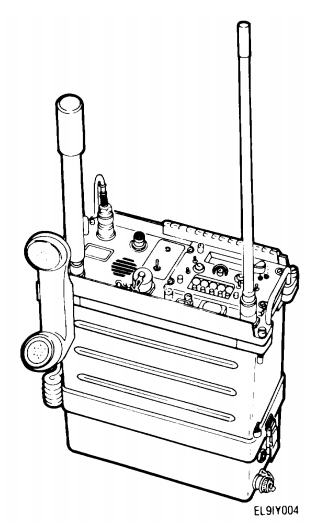Difference between revisions of "AN~URC-100"
RadioNerds (talk | contribs) |
RadioNerds (talk | contribs) |
||
| (6 intermediate revisions by the same user not shown) | |||
| Line 12: | Line 12: | ||
:AM or FM Emergency Beacon | :AM or FM Emergency Beacon | ||
;Frequency Range | ;Frequency Range | ||
| − | :116-150 | + | :AN/URC-100 |
| + | ::225-400 MHz | ||
| + | ::116-150 MHz | ||
| + | :AN/URC-101 | ||
| + | ::225-400 MHz | ||
| + | ::116-150 MHz | ||
| + | :AN/URC-104 | ||
| + | ::225-400 MHz | ||
| + | ::30-88 MHz | ||
;Number of Channels | ;Number of Channels | ||
:8,360 Channels in 25 kHz steps | :8,360 Channels in 25 kHz steps | ||
| Line 37: | Line 45: | ||
::12 July 1984 | ::12 July 1984 | ||
| + | |||
| + | ;{{pdf|TM_11-5895-1195-10-HR.pdf|TM 11-5895-1195-10-HR}} | ||
| + | :HAND RECEIPT | ||
| + | :COVERING CONTENTS OF COMPONENTS OF END ITEM (COEI), BASIC ISSUE ITEMS (BII), AND ADDITIONAL AUTHORIZATION LIST (AAL) | ||
| + | ::RADIO SETS | ||
| + | ::AN/URC-100 (NSN 5820-01 -112-0176) | ||
| + | ::AN/ URC-101 (NSN 5820-01-1 1 2-0177) | ||
| + | ::AN/URC-104 (NSN 5820-01-131-5674) | ||
| + | ::12 JULY 1984 | ||
| + | |||
| + | |||
| + | ;{{pdf|URC-101_OP_MAINT.pdf|Document No. 68-P09980V}} | ||
| + | :AN/URC-101 | ||
| + | :Portable Emergency Transceiver | ||
| + | ::Operation and Maintenance Manual | ||
| + | ::April 1985 | ||
| + | |||
| + | |||
| + | ;{{pdf|PTAD-101_Power_Supply.pdf|Document No. 68-P09158W}} | ||
| + | :PTAD-101 | ||
| + | :Power Supply | ||
| + | ::Operation and Maintenance Manual | ||
| + | ::April 1983 | ||
| + | |||
| + | |||
| + | ;{{pdf|single_channel_vhf_emulator.pdf|Document No. 68-P32903}} | ||
| + | :Single Channel VHF Emulator | ||
| + | ::Operation and Maintenance Manual | ||
| + | ::September 1988 | ||
[[Category:Military/Radios]] | [[Category:Military/Radios]] | ||
{{DISPLAYTITLE:AN/URC-100, 101, 104}} | {{DISPLAYTITLE:AN/URC-100, 101, 104}} | ||
Latest revision as of 14:40, 9 June 2015
The receiver/transmitter used in models AN/URC-100, AN/URC-101 and AN/UBC-104 is a solid-state voice line-of-sight radio set normally used to receive and transmit plain text voice messages. They can also be used with external COMSEC equipment to transmit and receive cipher text (encrypted or scrambled) messages. The AN/URC-100 and AN/URC-101 operate in the 116 to 150 MHz VHF band and in the 225 to 400 MHz UHF band The AN/URC-104 radio operates in the 30 to 88 MHz VHF band and in the 225 to 400 MHz UHF band. The three models are tunable across their frequency ranges in 25 kHz steps.
Operating power for the receiver/transmitter comes from the battery pack that supplies -28 V to operate the radio circuits and the front panel lamps. The display operates from +5 V which is stepped down from the +28V.
The receiver/transmitter should be operated at a 9:1 receive to transmit duty cycle. When operating at this ratio, the batteries will last 8 hours for low power (5 watts) output and 6 hours for high power (20 watts) output. Operating in the beacon mode the batteries will last 1.5 hours with low power (5 watt) output.
Specifications
- Modes
- AM or FM Voice
- AM or FM Cypher text
- AM or FM Emergency Beacon
- Frequency Range
- AN/URC-100
- 225-400 MHz
- 116-150 MHz
- AN/URC-101
- 225-400 MHz
- 116-150 MHz
- AN/URC-104
- 225-400 MHz
- 30-88 MHz
- Number of Channels
- 8,360 Channels in 25 kHz steps
- Power Output
- URC-100:
- High 5w
- Low 1.5w
- URC-101:
- VHF High 5w
- VHF Low 1.5w
- UHF/AM Low 1.5w
- UHF/AM High 5w
- UHF/FM Low 5w
- UHF/FM High 20w
Reference Files
- Operator’s Manual
- Radio Sets
- AN/URC-100 (NSN 5820-01-112-0176)
- AN/URC-101 (NSN 5820-01-112-0177)
- AN/URC-104 (NSN 5820-01-131-5674)
- 12 July 1984
- HAND RECEIPT
- COVERING CONTENTS OF COMPONENTS OF END ITEM (COEI), BASIC ISSUE ITEMS (BII), AND ADDITIONAL AUTHORIZATION LIST (AAL)
- RADIO SETS
- AN/URC-100 (NSN 5820-01 -112-0176)
- AN/ URC-101 (NSN 5820-01-1 1 2-0177)
- AN/URC-104 (NSN 5820-01-131-5674)
- 12 JULY 1984
- AN/URC-101
- Portable Emergency Transceiver
- Operation and Maintenance Manual
- April 1985
- PTAD-101
- Power Supply
- Operation and Maintenance Manual
- April 1983
- Single Channel VHF Emulator
- Operation and Maintenance Manual
- September 1988
